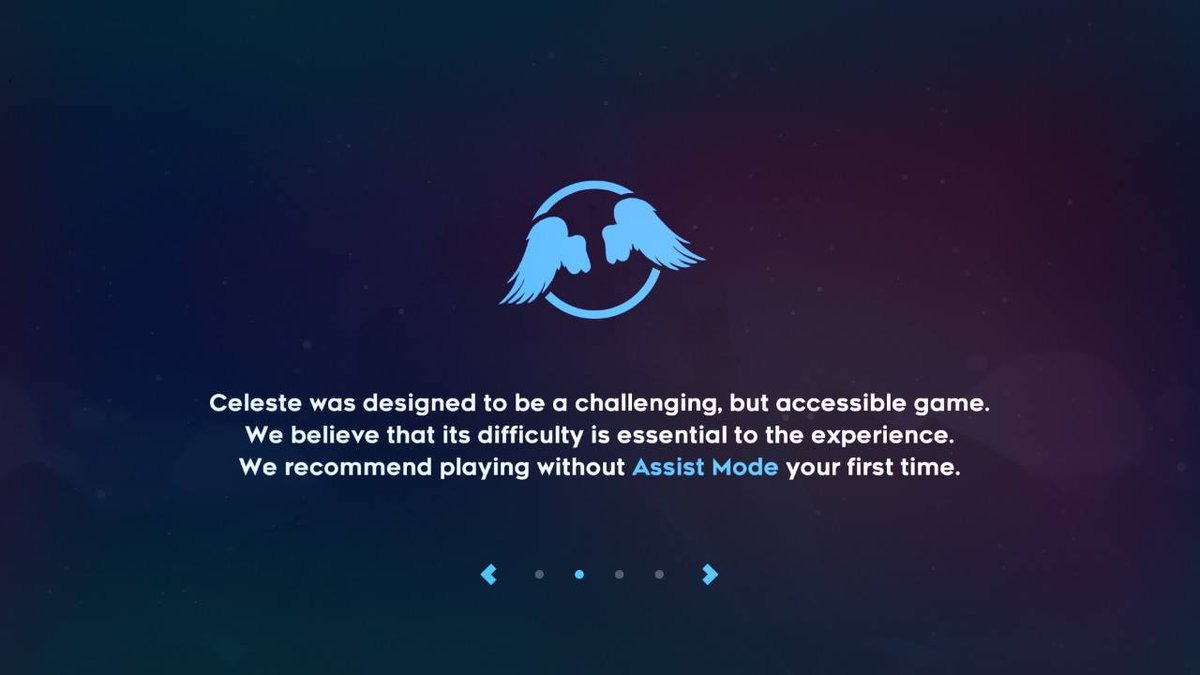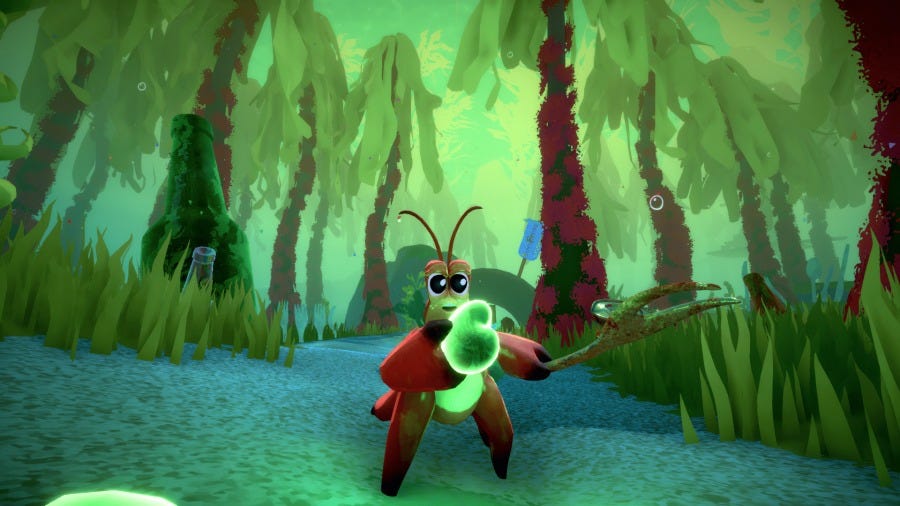My inevitable foray into game difficulty discourse
It's a hot topic and I have Some Thoughts on video game difficulty.
As long as there have been difficult games, there have been people saying there should be easy modes. As long as there have been gamers, people have wanted harder modes, and greater challenges. The debate bubbles up time and again, as many times as people are willing to venture an opinion (which, let’s face it, is all the time). This post is kind of me working through my complicated and conflicted feelings about the topic.
Games like Dark Souls and other FromSoftware classics, along with their many imitators and tail-chasers, popularised ‘hard games’, and ‘difficulty discourse’ soon followed. Video games are a unique medium – you can never be so bad at a film that you don’t get to finish it (there’s a very funny Dara O’Brien sketch about this – beware, it’s a little dirty, absolutely hilarious though). But it’s a built-in part of most games – it’s possible to simply not be good enough at them to make it through the content.
I believe pretty strongly in accessibility and the idea that video games are for everyone – but when it comes to games that are _hard_, the water is murkier. Accessibility means that everyone should be able to play every game, but the argument is that some games are designed to be hard. Difficulty is part of the artistic vision of the developers of these games, and for some (FromSoft particularly), they are striving to portray a grim world full of pain, anguish, and death. The fact that it’s hard isn’t just a gameplay choice, it’s a worldbuilding one, an artistic one, and a storytelling one. But unlike whether we have trees and moss or cactus and tumbleweeds, these choices have direct implications on the gameplay.
Accessibility means that users can remap the controller to use an adaptive one, or turn off motion blur, or activate colour blind mode, or read trigger warnings. Those are all accessibility considerations. Being able to turn the difficulty down…is that access? I think it’s a question without a definitive answer, a topic most people and all developers will have an opinion on.
Personally, I used to think I had a pretty firm stance on this debate. If video games are art that tells stories that are important and valuable and worth telling and experiencing (they are) then there should be ways for anyone who wants to participate to do so. Watching videos and live streams get you some of the way there but there’s something special about playing a game, embodying a character, and going through the story at your own pace that should not be denied to anyone.
I’ve experienced the letdown that comes when you reach a point in a game where it feels like there’s no progressing for you. The game The Witness is one of these – highly recommended and regarded, but the puzzles were just too hard for me. I wished for a hint system of some kind so I could uncover the mysteries that lay beyond the puzzles that I just couldn’t solve, but I just had to sadly uninstall the game and move on with my life. People want combat assists for Bloodborne so they can delve deeper into the nightmarish gothic horror of the world, but none is forthcoming.
But then, a couple of weeks ago, I got to play Another Crab’s Treasure by Aggro Crab (and review it – check that out here!). An underwater Souls-like that has granular adjustable difficulty settings, from taking a smidge less damage to giving Kril a one-hit-kill gun. In fact, because I had very limited time to play the game and write my review, I made heavy use of the Assist mode (mostly reducing incoming damage – I didn’t use the gun) to get through.
As it turns out, I have a lot of mixed feelings about this. I think a lot of them stem from the fact that actually in the past I have been able to persevere and make it past games. It might have taken me over 50 attempts to beat the first boss, but I did finish Dark Souls. It just took some perseverance.
Having used the assist mode for Another Crab’s Treasure makes me feel strange in a way that I don’t know that I would do if there had simply been a more traditional easy/medium/hard mode toggle. The granular control of difficulty settings really laid out the degree of assistance I was leaning on the game for. Pressing ‘easy mode’ and diving in would have had a different feel. I don’t know why I feel weird about this.
I’m also conflicted for another reason. If I had had unlimited time, would I have just persevered? I have no idea. I don’t know if I have the time or energy to replay the game to find out. I hardly have the time to play new games – I’ve not played something for this blog in weeks (to be fair, I had four university assignments, I had to play a 15–20-hour crab game, then family visiting, then a friend visiting). I also don’t know if I could have beaten the game without assist mode.
I can’t get over the incongruity of this occurrence. I got what I thought I wanted, so why does it feel so unsatisfying? I’ve tried to get to the bottom of this, and there’s something I keep coming back to.
Elden Ring is FromSoftware’s latest game. It’s also their biggest and most varied. It follows on from its predecessors and is almost entirely centred around the combat. It’s all about the fights. But Elden Ring manages to be way more accessible than the games before it, and it does this without any menu options, no sliders, and no easy mode. It achieves its modular, self-directed difficulty through in-game mechanics that psychologically feel very different to opening the menu and clicking a button that says, “Some extra damage resist please”.
I have touched on this in the past in the student newspaper I write for (in my article about why Elden Ring deserved to be Game of the Year) but it bears repeating. The world is so big that if you get stuck on something (which I frequently did) you could just wander away and find something else to tackle. Until very late in the game there were very few hard stops. This really helps to mitigate frustration. There are loads of things in the game to make yourself stronger – potions, spells, abilities, upgrades. There are tons of weapons to try out and find one that suits you. The summoning system has been expanded and improved, better integrated, and less punishing: you can summon NPCs, Spirits, or even friends. You can take the time to find the best armour for the encounter you’re stuck on. There are myriad choices you can make to ease the friction inherent in the game. Likewise, if you prefer a more challenging experience, you can choose not to engage with these systems.
It feels like such an organic, makes-sense-in-the-game-world way to tailor the difficulty. The game meets you where you’re at. Honestly, it makes Another Crab’s Treasure’s menu options feel unsatisfying. On the other hand, I recognise that FromSoftware is a huge company (nearly 400 staff as of mid-2023) and Aggro Crab has just 11 full-time staff, and there’s obviously a huge gulf between what they can each achieve and what players can and should expect from a game from each of them.

As with most lines of ‘discourse’ I don’t think there’s a good answer – both sides of this debate have valid and important points, and I think for most people, the nuance and the specifics will mean very few people draw their line in the same place. Some people will welcome options like those in Another Crab’s Treasure, some will prefer systems like Elden Ring, and some will consider themselves purists and want none of it. It has been valuable for me to experience Another Crab’s Treasure because it has helped me solidify my own stance in the debate. I want to be able to make games easier (I leaned hard on Spirit Summons in my play through of Elden Ring) but I don’t want to open an ‘assist’ menu and try to curate my own experience in a way that makes me feel somehow lesser, regardless of whether that feeling is all in my head or not. Human emotions are strange and fickle and unpredictable and that remains so when it comes to video game difficulty discourse.
What do you think? I’d really love to hear what you all feel about this topic. Also, how do you feel about a more general gaming thoughts post rather than a specific review? If you like it, I have plenty more Thoughts bouncing around that I could share. Let me know.





Please do write more of these thoughts articles they're really good! I really think you have done a good job of highlighting the conflict I feel about difficulty settings in games. I always play games on the harder difficulties even for a first play through, but that's because of what I enjoy put of games. I like the challenge. But that's just me, and having adjustable settings wouldn't affect me at all I would just ignore them and battle on. Ultimately I think it's good they exist for others who want different things from games and still want to experience the same game as others and not be locked out of the conversation.
Thank you for your thoughtful and balanced insights on this often contentious discussion! I have a few thoughts of my own too.
1. I think part of the conflict you feel comes from your motivations to play a game (this is top of mind for me because I wrote about research into motivations for playing games a couple of weeks ago). Players who are hunting for achievements will likely appreciate the choice that a game like Elden Ring gives them in adjusting the difficulty on their own terms. On the flip side, making these players adjust a difficulty slider might “tarnish” their hunt for achievements. Players who want something else out of games (like just experiencing the story) will likely have no problems adjusting sliders to experience the story. I think individual player motivations often get overlooked or forgotten in this heated discussion.
2. Part of why I think this discussion gets heated is because sometimes people forget that accessibility isn’t one dimensional. Difficulty is one aspect of accessibility, but not the whole story. For example, if sound prompts are a big part of how you get through an encounter, no amount of difficulty slider adjustments (to reduce incoming damage etc.) will help someone who cannot hear. Instead, they’ll need a visual cue replacement. I am (fortunately) not disabled, so I don’t have a full understanding of what all the accessibility options could/should be, but if you are curious, I would highly recommend following Steven Spohn on Twitter/X as he is a big advocate for accessible gaming!
3. Finally, for “difficulty is the point” games, I think again, there’s a bit of a one-dimensional take on it. What is difficult can be different for people of different abilities. But that difficulty is usually programmed into games one dimensionally (for example, a series of well-timed controller inputs) and rightly so, since it would be almost impossible to think of all the different ways a player might experience difficulty, and then incorporate that into a game. What I feel like is missing is some thought to how someone could remap controller input difficulty into a different type of difficulty. That’s the limit of my understanding and knowledge though, so I’d love to hear some of your thoughts!